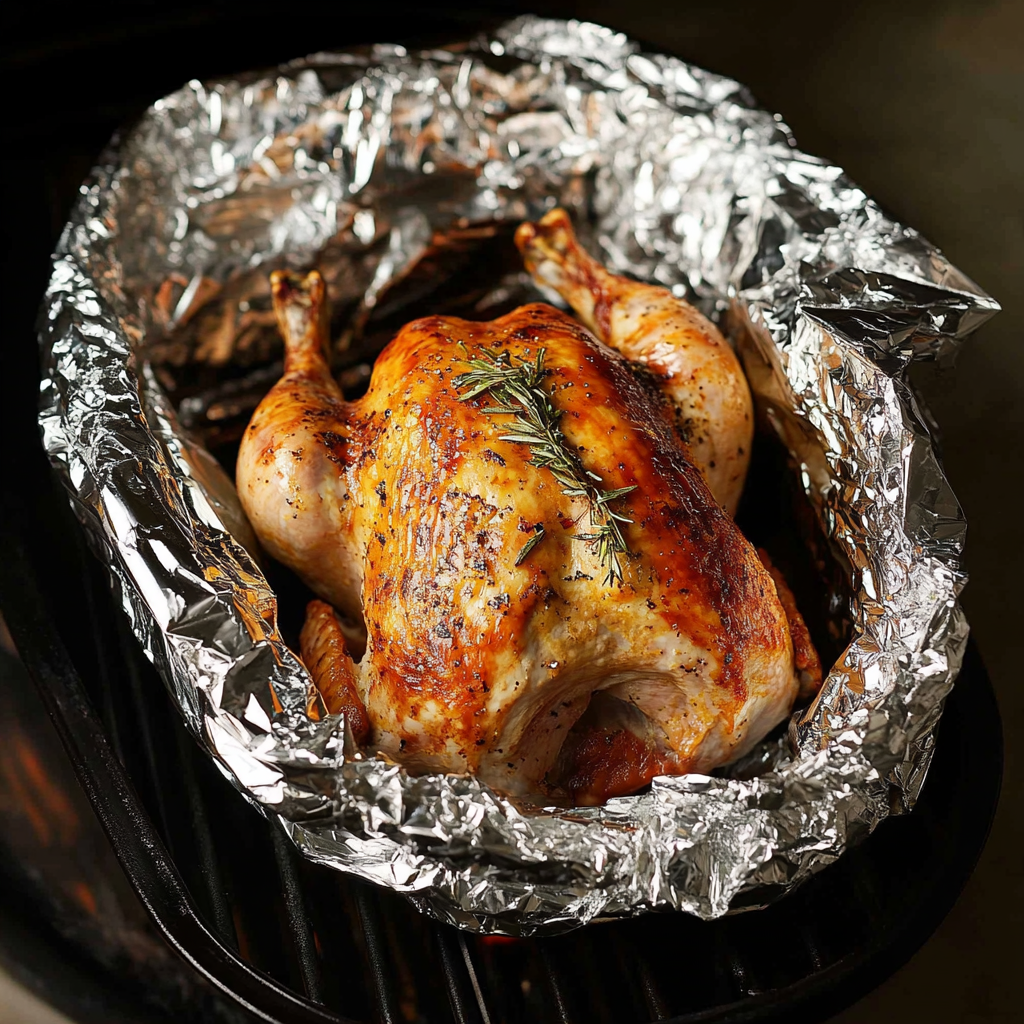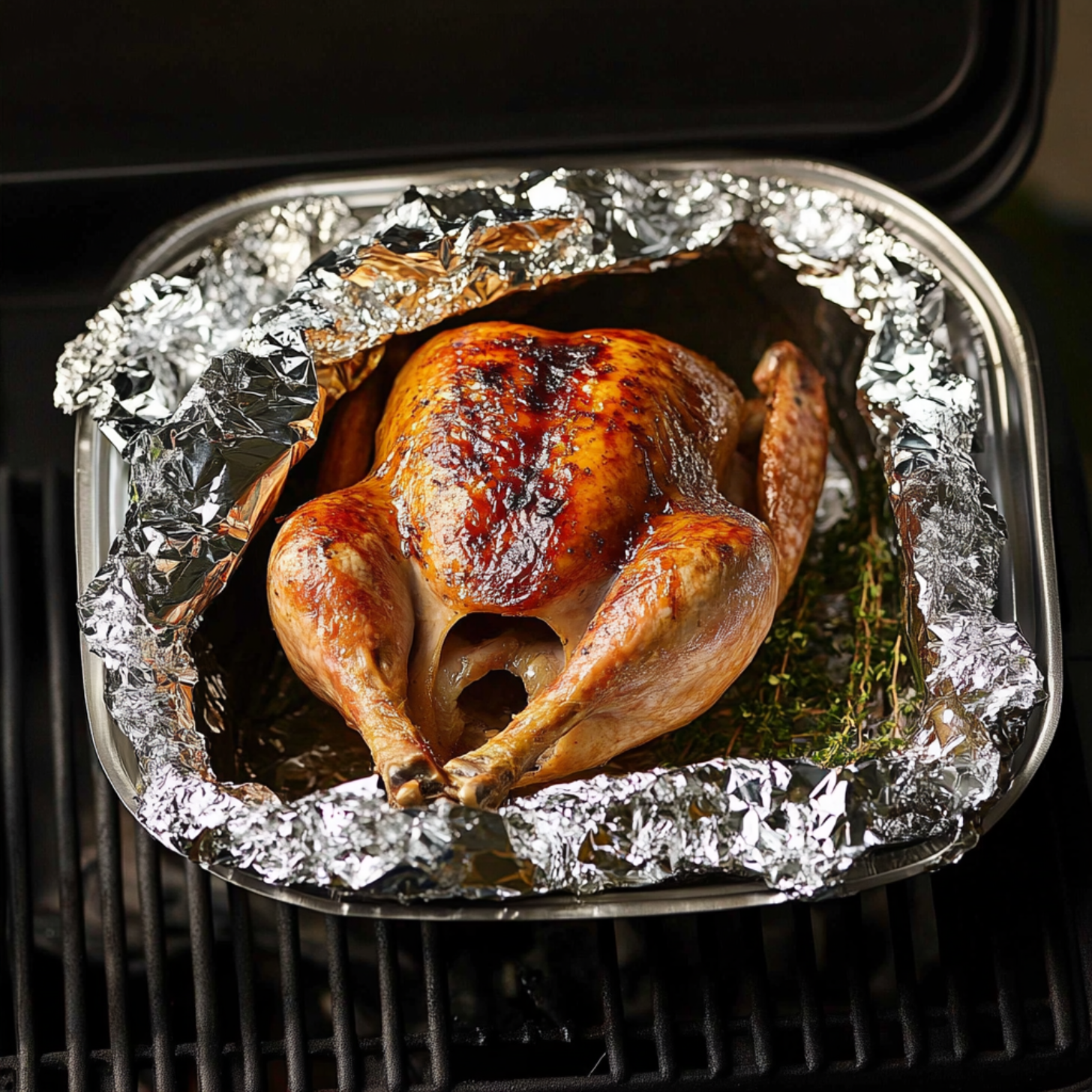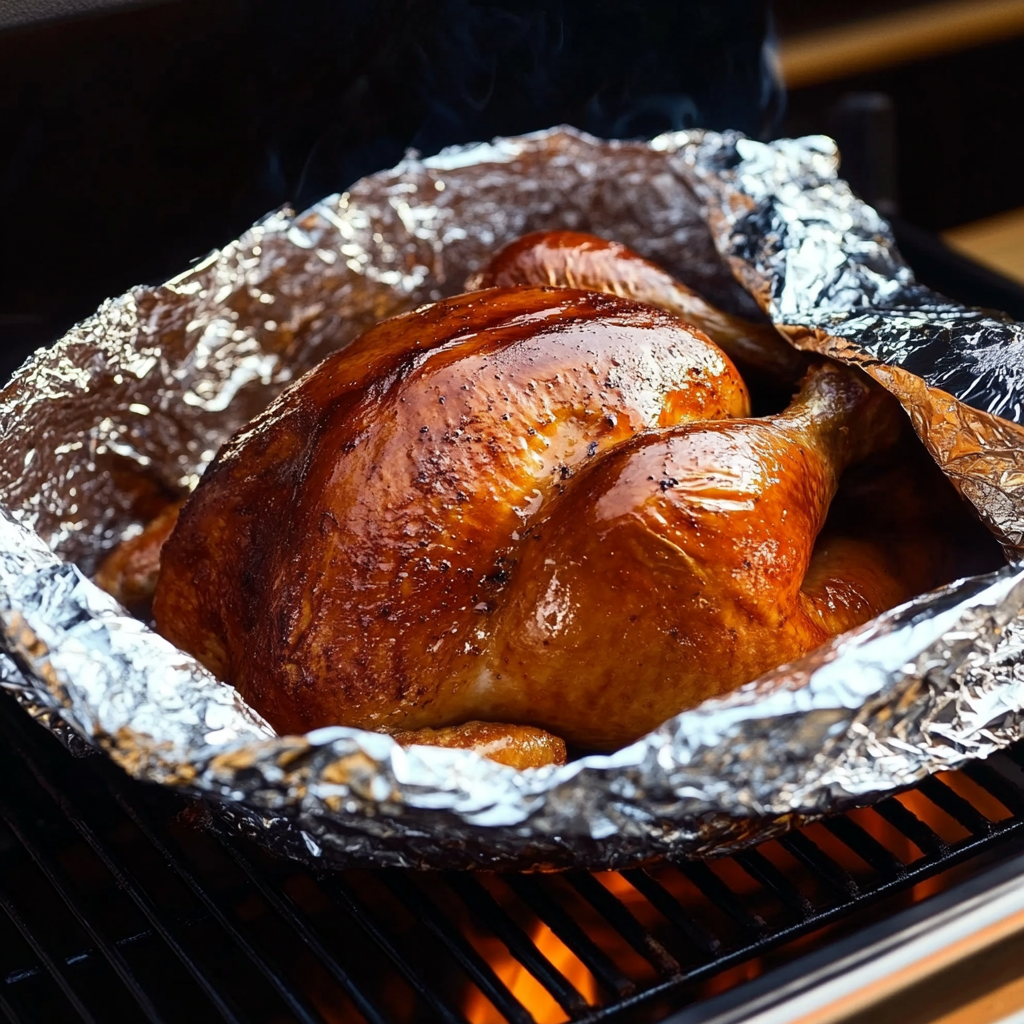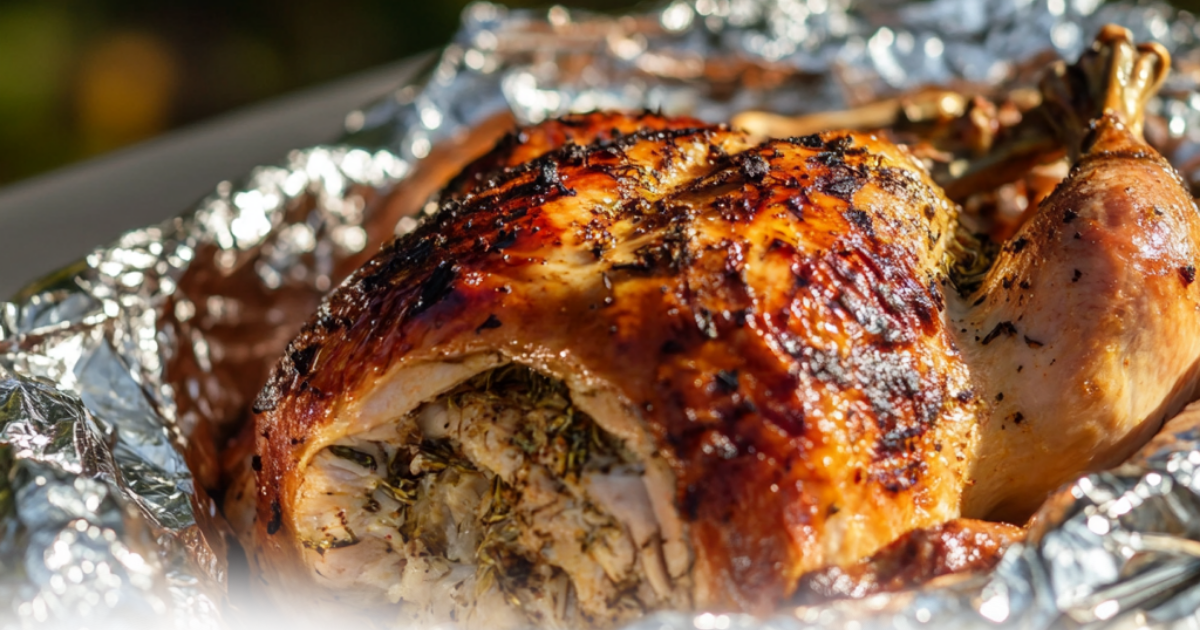Grilling turkey is an art. It’s not just about firing up the grill but understanding the nuances of the bird itself. Whether you’re planning to cover your turkey with foil while grilling or leave it exposed, your choice can significantly impact the final dish’s texture, flavor, and appearance. In this article, we’ll walk you through the basics, explore the role of aluminum foil, weigh the pros and cons, and even dive into alternative methods to get that perfectly juicy and flavorful turkey. So, let’s get started!
Table of contents
Understanding the Basics of Grilling Turkey
Grilling Turkey: A Popular Cooking Method
Turkey isn’t just for Thanksgiving anymore—it’s a versatile bird that’s great on the grill, perfect for outdoor gatherings or family meals. Grilling brings a smoky flavor that ovens just can’t replicate. It also allows for creative seasoning and cooking techniques, like basting or dry rubs, to make the dish your own.

However, grilling a turkey isn’t as straightforward as cooking burgers or chicken wings. The larger size and leaner meat require careful attention to ensure it cooks evenly without drying out. That’s where the debate begins: should you cover turkey with foil when grilling to keep it moist?
Why Cooking Method Matters for Turkey Texture and Moisture
Turkey’s white meat is notoriously prone to drying out, especially when exposed to high, direct heat. Without proper techniques, you might end up with a bird that’s charred outside but undercooked inside. Grilling with or without foil plays a pivotal role in maintaining a balance between moisture and crispiness.
When grilling, two primary concerns arise:
- Retaining the meat’s natural juices.
- Achieving that perfect golden-brown, slightly crispy skin.
By understanding how grilling works, you can decide whether covering the turkey with foil will help meet these goals or hinder them. In the next section, we’ll uncover the mystery behind aluminum foil’s role in grilling and why it’s often recommended.
The Role of Aluminum Foil in Turkey Preparation
What Does Foil Do in Cooking?
Aluminum foil is more than just a shiny sheet you keep in your kitchen drawer; it’s a valuable tool when it comes to cooking meat. So, do you cover turkey with foil when grilling? The answer often depends on your goals. Foil acts as a shield, protecting delicate meat from the intense heat of a grill. By trapping steam, it helps retain moisture, making your turkey tender and juicy.
When grilling turkey, especially larger cuts like the breast, foil can also prevent certain parts from cooking too quickly. This is particularly helpful if you’re aiming for even doneness without overcooking thinner areas or leaving the center raw.
Using foil has its trade-offs, though. While it keeps moisture locked in, it also prevents direct exposure to heat, which can slow down browning and crisping of the skin. For many grill enthusiasts, that golden, crispy skin is non-negotiable.
Common Scenarios for Using Foil When Grilling
Grilling turkey isn’t a one-size-fits-all process. Here are some specific situations where using foil could be your best bet:
- During long grilling sessions: If your turkey requires extended time on the grill, covering it partway through can prevent it from drying out.
- For windy or unpredictable weather: On breezy days, foil can help maintain consistent heat and keep your grill temperature stable.
- When cooking turkey parts: Smaller cuts, like drumsticks or wings, can benefit from brief wrapping to avoid over-browning.

Explore expert tips on grilling techniques and whether to grill a turkey breast side up or down.
Pros and Cons of Covering Turkey with Foil When Grilling
Advantages: Moisture Retention and Even Cooking
One of the biggest perks of covering turkey with foil is its ability to lock in moisture. Grilled turkey can lose a lot of its natural juices to high heat, leading to dry, chewy meat. Wrapping it in foil creates a mini steam chamber, ensuring the meat stays tender.
Foil also promotes even cooking by distributing heat more uniformly. For example, the breast meat—prone to overcooking—benefits from the protective barrier, reducing the risk of a dry outcome. Plus, if you’re grilling a whole turkey, wrapping it in foil early on can help prevent over-browning while the interior cooks.
- Key Benefit: It’s a lifesaver for those aiming for tender, evenly cooked turkey without much fuss.
Potential Drawbacks: Crispy Skin vs. Soft Skin Debate
Of course, using foil isn’t without its downsides. The biggest complaint is the lack of crispiness. Direct heat exposure is what gives turkey skin its golden-brown, slightly charred texture. By covering the bird with foil, you miss out on some of that beautiful crisping action.
Another issue is timing. If you leave the foil on for too long, the turkey can become overly steamed, resulting in a texture that feels more boiled than grilled. That’s why many grilling experts recommend a hybrid approach: cover the turkey with foil for most of the cooking, then remove it during the last 20-30 minutes to let the skin crisp up.
In the ongoing debate of “Do you cover turkey with foil when grilling?” the answer might be somewhere in the middle—it’s all about timing and technique.
Step-by-Step Guide: How to Grill Turkey with Foil
Preparation: Choosing the Right Turkey Size for Grilling
Before even firing up your grill, size matters. For grilling, a turkey that’s 12-14 pounds is ideal. Larger birds can cook unevenly, especially when using foil. Make sure your turkey is thawed properly, as frozen spots can disrupt cooking. Pat it dry and apply your seasoning or marinade liberally for maximum flavor absorption.
If you’re wondering “Do you cover turkey with foil when grilling?” at this stage, the answer is not yet. Start without foil for proper heat distribution during the initial cooking phase.

Timing and Temperature Adjustments When Using Foil
The trick to a perfect grilled turkey lies in balancing high heat and moisture retention. Begin grilling with medium-high heat, keeping the turkey uncovered to allow the surface to develop a nice golden hue. After 60-90 minutes, when the skin is lightly browned, you can cover the turkey with foil to lock in juices.
Make sure the foil is tented rather than tightly wrapped. This allows some air circulation, preventing sogginess while protecting the meat. Lower the heat slightly at this stage to prevent burning.
Tips for Achieving the Perfect Balance of Moisture and Crispiness
For the best of both worlds—moist meat and crispy skin—remove the foil during the last 20-30 minutes of grilling. Crank up the heat slightly to finish the turkey with a beautifully browned exterior. Use a meat thermometer to ensure the internal temperature reaches 165°F in the thickest part of the turkey breast.
If you’re looking for more delicious grilling tips, check out this article on grilling turkey breast.
Alternatives to Foil for Moisture and Browning Control
Using Grill Lids or Basting Techniques
If you’re hesitant about using foil, grill lids can be an excellent alternative. Closing the lid creates a controlled environment similar to foil’s effect, trapping heat and moisture without direct contact. Additionally, frequent basting with butter or broth keeps the meat juicy while enhancing flavor.
However, basting can interrupt cooking if done too often. A good rule of thumb is to baste every 30 minutes, ensuring you don’t lose too much heat.
Exploring Other Covering Options
For those who prefer a more natural approach, using banana leaves or parchment paper can offer similar moisture-retention benefits without aluminum. These coverings also add unique flavors to the turkey.
Alternatively, consider starting with a wet brine before grilling. This method pre-infuses moisture into the meat, reducing the need for additional coverings during cooking.
Whether you choose foil, a grill lid, or other methods, the ultimate goal is a flavorful turkey that’s juicy on the inside and crispy on the outside.
Common Questions About Grilling Turkey with Foil
Can You Grill Turkey Without Using Foil?
Absolutely! You can grill turkey without foil, but it requires careful monitoring to prevent drying out. Techniques like frequent basting or using a grill lid can help retain moisture while achieving that desired crispy exterior. If you prefer no foil, starting with a wet brine can also boost the bird’s juiciness.
How Do You Prevent Turkey from Over-Browning?
Over-browning is a common concern when grilling turkey. Covering the turkey with foil halfway through the cooking process can shield it from direct heat, preventing the skin from charring too quickly. Alternatively, moving the turkey to an indirect heat zone on the grill also works well.
Does Covering with Foil Reduce Grilling Time?
Yes, it can. Foil traps heat and moisture, cooking the turkey more evenly and slightly faster. However, you must still use a meat thermometer to ensure the turkey is fully cooked. Aim for an internal temperature of 165°F in the thickest part of the bird for safe consumption.
What Are the Benefits of Using Foil When Grilling Turkey?
Using foil while grilling turkey has several advantages. It helps retain moisture, ensuring the meat stays juicy and tender. Foil also protects the turkey from excessive charring or drying out, especially during long cooking times. Additionally, it simplifies cleanup by reducing drips and grill residue.
Can You Add Flavors While Using Foil?
Yes! Foil packets are a great way to infuse turkey with additional flavors. You can add fresh herbs, garlic, citrus slices, or even a splash of white wine or broth inside the foil wrap. As the turkey cooks, these flavors penetrate the meat, creating a more aromatic and flavorful dish.
For more grilling ideas and turkey recipes, check out this comprehensive guide to turkey grilling techniques.

